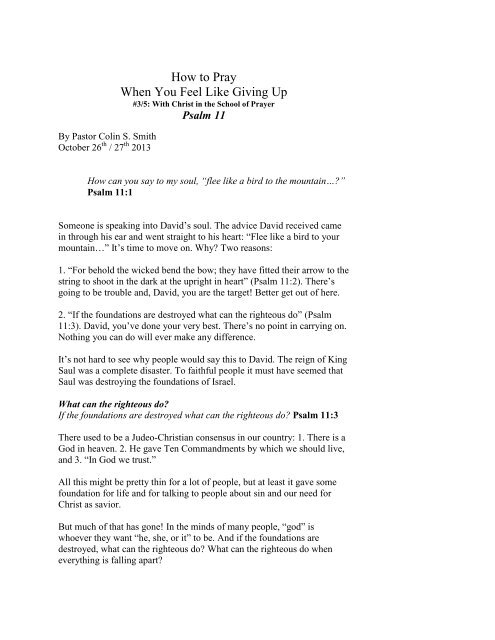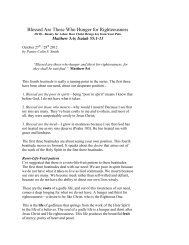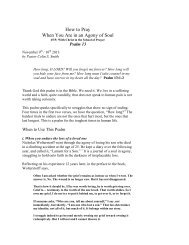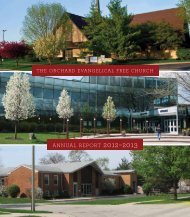How to Pray When You Feel Like Giving Up
How to Pray When You Feel Like Giving Up - The Orchard
How to Pray When You Feel Like Giving Up - The Orchard
- No tags were found...
You also want an ePaper? Increase the reach of your titles
YUMPU automatically turns print PDFs into web optimized ePapers that Google loves.
By Pas<strong>to</strong>r Colin S. Smith<br />
Oc<strong>to</strong>ber 26 th / 27 th 2013<br />
<strong>How</strong> <strong>to</strong> <strong>Pray</strong><br />
<strong>When</strong> <strong>You</strong> <strong>Feel</strong> <strong>Like</strong> <strong>Giving</strong> <strong>Up</strong><br />
#3/5: With Christ in the School of <strong>Pray</strong>er<br />
Psalm 11<br />
<strong>How</strong> can you say <strong>to</strong> my soul, “flee like a bird <strong>to</strong> the mountain…?”<br />
Psalm 11:1<br />
Someone is speaking in<strong>to</strong> David’s soul. The advice David received came<br />
in through his ear and went straight <strong>to</strong> his heart: “Flee like a bird <strong>to</strong> your<br />
mountain…” It’s time <strong>to</strong> move on. Why? Two reasons:<br />
1. “For behold the wicked bend the bow; they have fitted their arrow <strong>to</strong> the<br />
string <strong>to</strong> shoot in the dark at the upright in heart” (Psalm 11:2). There’s<br />
going <strong>to</strong> be trouble and, David, you are the target! Better get out of here.<br />
2. “If the foundations are destroyed what can the righteous do” (Psalm<br />
11:3). David, you’ve done your very best. There’s no point in carrying on.<br />
Nothing you can do will ever make any difference.<br />
It’s not hard <strong>to</strong> see why people would say this <strong>to</strong> David. The reign of King<br />
Saul was a complete disaster. To faithful people it must have seemed that<br />
Saul was destroying the foundations of Israel.<br />
What can the righteous do?<br />
If the foundations are destroyed what can the righteous do? Psalm 11:3<br />
There used <strong>to</strong> be a Judeo-Christian consensus in our country: 1. There is a<br />
God in heaven. 2. He gave Ten Commandments by which we should live,<br />
and 3. “In God we trust.”<br />
All this might be pretty thin for a lot of people, but at least it gave some<br />
foundation for life and for talking <strong>to</strong> people about sin and our need for<br />
Christ as savior.<br />
But much of that has gone! In the minds of many people, “god” is<br />
whoever they want “he, she, or it” <strong>to</strong> be. And if the foundations are<br />
destroyed, what can the righteous do? What can the righteous do when<br />
everything is falling apart?
2<br />
Who is giving this advice <strong>to</strong> David? We are not <strong>to</strong>ld, but most likely, these<br />
were the words of a friend who cared about him deeply. And it was<br />
entirely reasonable advice.<br />
David got himself in <strong>to</strong> some pretty dangerous situations: He had been<br />
chosen by God <strong>to</strong> replace King Saul. But Saul fought against this till the<br />
end of his life. Saul was given <strong>to</strong> fits of rage and on one occasion he threw<br />
a javelin at David attempting <strong>to</strong> pin him <strong>to</strong> the wall (1 Samuel 19:10).<br />
It would be very natural for someone who cared about David <strong>to</strong> say,<br />
“David, Saul has it in for you. His arrows are aimed at you. <strong>You</strong> are a<br />
righteous man, but you are not safe. There’s nothing you can do here.<br />
Flee like a bird <strong>to</strong> your mountain.<br />
Indeed this is exactly what happened. David was married <strong>to</strong> Saul’s<br />
daughter Michal. And after Saul had thrown the spear, she said <strong>to</strong> David,<br />
“If you don’t leave <strong>to</strong>night, Saul will kill you.”<br />
Saul had sent his agents <strong>to</strong> David’s house. So Michal let her husband<br />
down on a rope from the bedroom window, and put a stuffed dummy in<br />
his bed <strong>to</strong> allow him time <strong>to</strong> escape. The Bible says “David fled and<br />
escaped” (1 Samuel 19:18).<br />
Should I stay or should I go?<br />
There are times when that is the right thing <strong>to</strong> do. Jesus said, “<strong>When</strong> they<br />
persecute you in one <strong>to</strong>wn, flee <strong>to</strong> the next” (Matthew 10:23). But another<br />
time a crowd in the temple <strong>to</strong>ok up s<strong>to</strong>nes <strong>to</strong> s<strong>to</strong>ne Jesus, and Scripture<br />
says, “Jesus hid himself” (John 8:59).<br />
<strong>When</strong> we face situations of difficulty and danger we always have a choice:<br />
Should I stay or should I go? If someone is pointing a javelin at you<br />
there’s a pretty good case for running <strong>to</strong> the hills!<br />
But we all know that there are times when change is appropriate. We also<br />
face times when we know that God is calling us <strong>to</strong> persevere. What we<br />
need is the strength <strong>to</strong> do so. This psalm is for these times. It’s about how<br />
<strong>to</strong> pray when you feel like giving up.<br />
Notice how David responds <strong>to</strong> the well-meaning advice of his friends: “In<br />
the Lord I take refuge… <strong>How</strong> can you say <strong>to</strong> my soul flee like a bird <strong>to</strong><br />
your mountain.” <strong>How</strong> can you say <strong>to</strong> me “when the foundations are<br />
destroyed what can the righteous do?”
3<br />
<strong>How</strong> did David do that? <strong>How</strong> can you do that? <strong>How</strong> can you take refuge in<br />
God when you are filled with frustration and you feel like giving up?<br />
Four Ways <strong>to</strong> <strong>Pray</strong> <strong>When</strong> <strong>You</strong> <strong>Feel</strong> <strong>Like</strong> <strong>Giving</strong> <strong>Up</strong><br />
Here is how <strong>to</strong> pray when you feel that nothing is coming of your effort,<br />
everyone is against you, and you need <strong>to</strong> find strength <strong>to</strong> persevere.<br />
1. Challenge the voice of fear and frustration<br />
<strong>How</strong> can you say <strong>to</strong> my soul “Flee like a bird <strong>to</strong> your mountain”?<br />
Psalm 11:1<br />
This well-meaning advice was given by David’s friends out of fear and<br />
frustration: “Behold the wicked bend they bow; they have fitted their<br />
arrow <strong>to</strong> the string.” That’s fear. “David, you’re going <strong>to</strong> be harmed if you<br />
stick around here.<br />
If the foundations are destroyed, what can the righteous do?” That’s<br />
frustration. And notice how David challenges these voices: “<strong>How</strong> can you<br />
say [these things] <strong>to</strong> my soul…?”<br />
David is not addressing the Lord directly in this psalm. He does not say,<br />
“In you, O Lord, do I take refuge.” He says, “In the Lord I take refuge.”<br />
This is a didactic (or a teaching) psalm that gives us a framework for<br />
praying when you feel like giving up.<br />
David is challenging the thoughts of his own soul in the presence of God.<br />
And there are times when you will need <strong>to</strong> learn the art of speaking <strong>to</strong><br />
yourself in the presence of God.<br />
<strong>You</strong> find this many times in the Psalms: “Bless the Lord, O my soul, and<br />
all that is within me, bless his holy name” (Psalm 103:1). David is<br />
speaking <strong>to</strong> himself. He is challenging himself. “Why are you cast down,<br />
O my soul, and why are you in turmoil within me” (Psalm 42:5)? He is<br />
challenging the disturbance within his own soul.<br />
Martyn Lloyd-Jones often said, “One of our main problems in the<br />
Christian life is that we spend <strong>to</strong>o much time listening <strong>to</strong> ourselves and not<br />
enough talking <strong>to</strong> ourselves.”<br />
We spend <strong>to</strong>o much time listening <strong>to</strong> the voices of fear and frustration and<br />
complaining. We need <strong>to</strong> speak <strong>to</strong> ourselves. We sometimes call this<br />
“preaching the gospel <strong>to</strong> ourselves.”
4<br />
We need <strong>to</strong> challenge the voice of fear and frustration. And there is no<br />
better place <strong>to</strong> do that than when you come in<strong>to</strong> the presence of God in<br />
prayer.<br />
Come in<strong>to</strong> the presence of the Father with Jesus Christ beside you. Tell<br />
him what you are feeling and what you are hearing. Bring your worst<br />
thoughts in<strong>to</strong> the open, then take yourself in hand, and challenge the voice<br />
of fear and frustration right there in the presence of God.<br />
“Lord, here’s what I am afraid of. Lord, here is where I feel frustrated <strong>to</strong><br />
the point of despair…” <strong>You</strong> may need <strong>to</strong> do this in regard <strong>to</strong> your own<br />
thoughts, and you may need <strong>to</strong> do this in regard <strong>to</strong> the well-meaning<br />
advice you are receiving from others. They may mean well, but what they<br />
are actually doing is sapping your will.<br />
Jesus knows about this<br />
As we think about this psalm in relation <strong>to</strong> our Lord, it’s pretty obvious<br />
that he knew what it was for the wicked <strong>to</strong> bend the bow, fit their arrows<br />
<strong>to</strong> the string, and <strong>to</strong> take their aim at him.<br />
Christ was “upright in heart” (Psalm 11:2) and from the earliest days of<br />
his ministry he was in the cross-hairs of wicked men. The arrows were<br />
always pointed at him.<br />
At least twice, Christ had <strong>to</strong> challenge the well-meaning advice of his<br />
friends: “Some Pharisees came and said <strong>to</strong> him, ‘Get away from here, for<br />
Herod wants <strong>to</strong> kill you’” (Luke 13:31).<br />
Most of the Pharisees were enemies of Jesus. But here were Pharisees who<br />
were well-disposed <strong>to</strong>wards Jesus, well-meaning friends who wanted <strong>to</strong><br />
warn him of danger.<br />
Jesus challenged the voice of fear and despair: “Go and tell that fox,<br />
‘behold I cast out demons and perform cures <strong>to</strong>day and <strong>to</strong>morrow, and the<br />
third day I finish my course’” (Luke 13:32). In other words, “I’m not<br />
going anywhere. I’m set on my course, and I’m going <strong>to</strong> finish it.”<br />
The second time Jesus had <strong>to</strong> resist the well-meaning advice of a friend is<br />
much better known—the time when Peter confessed that Jesus is the<br />
Christ, the Son of the living God (Matthew 16:16).<br />
After Peter said this, Jesus began <strong>to</strong> tell his disciples that he must go <strong>to</strong><br />
Jerusalem, that he must suffer many things, that he must be killed, and<br />
then rise in the third day.
5<br />
Peter responded, “Far be it from you, Lord! This shall never happen <strong>to</strong><br />
you” (Matthew 16:22). In other words, “I’m following you, Jesus. That<br />
cannot happen <strong>to</strong> you. This is the one thing that can never happen.”<br />
Jesus challenged the voice of fear and despair: “Get behind me, Satan!”<br />
Satan’s temptation came in the form of the well-meaning advice of a<br />
friend who wanted <strong>to</strong> be protective of him, but who had no discernment of<br />
God’s will in this situation.<br />
H. L. Ellison said this well, “The love of your friends will often create<br />
your most subtle temptations.” 1 People who care about you may say <strong>to</strong><br />
you “What’s the point in carrying on? It will only take a <strong>to</strong>ll on you, and<br />
nothing good will come of it.” Their words go in<strong>to</strong> your soul. <strong>You</strong> need <strong>to</strong><br />
challenge the voice of fear and frustration.<br />
In the LORD I take refuge!<br />
<strong>How</strong> can you say <strong>to</strong> my soul,<br />
‘Flee like a bird <strong>to</strong> your mountain?’<br />
In the Lord I take refuge!<br />
If the foundations are destroyed<br />
What can the righteous do?<br />
2. Recognize the hand of God in the testing<br />
The LORD tests the righteous… Psalm 11:5<br />
His eyelids test the children of man… Psalm 11:4<br />
Remember, when the foundations are shaken, the hand of God is in the<br />
shaking. God says, “Once more I will shake not only the earth but also the<br />
heavens” (Hebrews 12:26).<br />
What is God doing when he shakes the things that are familiar in our<br />
lives? God gives us the reason: He shakes the foundations so that “the<br />
things that cannot be shaken may remain” (Hebrews 12:27).<br />
Derek Kidner comments: “The collapse of what is built on sand may be<br />
distressing; it can also be a beginning.” God shakes something that’s built<br />
on sand so that it might be rebuilt on a better foundation.<br />
This is what happened <strong>to</strong> Job. Job was a righteous man, and God had<br />
blessed him in many ways. But then in one day, the whole infrastructure<br />
of his life was hit by multiple disasters.<br />
Job’s wealth, represented in flocks and herds, was plundered by raiders.<br />
His home was destroyed by a mighty wind. And worst of all, his children,<br />
who were inside the house, died in the rubble.
6<br />
The foundations were shaken for Job. Suddenly all the good gifts on<br />
which we naturally depend were taken from him: Home, family, and<br />
business. It’s all gone.<br />
Job’s wife said, “Why don’t you curse God and die? What’s the point?<br />
Everything that we’ve lived for is gone. Everything we’ve worked for is<br />
gone. God has it in for you. His arrow is obviously pointed at you. Job,<br />
you’re a righteous man, but when the foundations are destroyed what’s the<br />
use of faith and a righteous life? Curse God and die!”<br />
The one right next <strong>to</strong> him was giving voice <strong>to</strong> her fears and frustrations. It<br />
must have gone right in<strong>to</strong> his soul. Job heard the voice of fear, frustration,<br />
and despair, but he <strong>to</strong>ok refuge in God: “God knows the way that I take.<br />
<strong>When</strong> he has tested me I will come forth as gold” (Job 23:10 NIV).<br />
The testimony of this man’s faith reverberated in heaven and in hell, and<br />
even <strong>to</strong>day, it brings strength <strong>to</strong> believers across the world.<br />
Peter must have had this verse in mind when he said: <strong>You</strong>r faith is going<br />
<strong>to</strong> be tested with trials of many kinds. <strong>When</strong> that happens it is like gold<br />
being refined in the fire. Through this test, your faith will be proved<br />
genuine and it will rebound <strong>to</strong> praise glory and honor when Jesus Christ is<br />
revealed (1 Peter 1:7).<br />
3. Affirm the sovereignty of God at the hardest times<br />
The LORD is in his holy temple;<br />
The LORD’s throne is in heaven. Psalm 11:4<br />
David overcomes fear, frustration, and the temptation <strong>to</strong> despair by fixing<br />
his mind and his heart on God. Here’s how I take refuge in God. Here’s<br />
how I fix my eyes on the Lord:<br />
The Lord is in his holy temple (11:4)<br />
The Lord’s throne is in heaven (11:4)<br />
His eyes see (11:4)<br />
The Lord tests the righteous (11:5)<br />
His soul hates the wicked (11:5)<br />
Let him rain coals on the wicked (11:6).<br />
For the Lord is righteous (11:7)<br />
God is still on the throne! I may be experiencing fear or frustration but<br />
God is not in a panic. I can’t put things right when the foundations are<br />
destroyed, but God can. I can’t deal with the wicked, but God can, and he<br />
will.
7<br />
He loves righteous deeds (11:7)<br />
The foundations of righteousness do not lie in our culture. They never<br />
have. The foundations of righteousness lie in who God is and in what God<br />
loves. God is still on the throne!<br />
4. Anticipate the joy of the final outcome<br />
The upright shall behold his face. Psalm 11:7<br />
It’s hard <strong>to</strong> imagine a greater incentive for pressing on in the pursuit of a<br />
righteous life than this: The upright shall behold his face. I’m going <strong>to</strong> see<br />
the face of God.<br />
“<strong>How</strong> can you say <strong>to</strong> me, ‘Flee like a bird <strong>to</strong> your mountain’?” Why do<br />
you think that when the foundations are destroyed there is nothing the<br />
righteous can do? I’m not giving up! In God I take refuge. God is on his<br />
throne. Whatever happens in this world, I’m going <strong>to</strong> behold his face.<br />
There’s a true s<strong>to</strong>ry of a man by the name of William Montague Dyke.<br />
<strong>When</strong> William was ten years old, he was blinded in an accident. While he<br />
was in university, William fell in love with the daughter of a high ranking<br />
British naval officer, and they became engaged.<br />
Shortly before the wedding, William had eye surgery in the hope that the<br />
operation would res<strong>to</strong>re his sight. It was a one-time deal. If it failed,<br />
William would remain blind for the rest of his life.<br />
Because it was only a short time away, William insisted on keeping the<br />
bandages that were on his face until the day of the wedding. If the surgery<br />
was successful, he wanted the first person he saw <strong>to</strong> be his new bride.<br />
The wedding day arrived, and the guests assembled <strong>to</strong> witness the couple<br />
taking their vows. William’s father, Sir William Hart Dyke, and the doc<strong>to</strong>r<br />
who performed the surgery s<strong>to</strong>od next <strong>to</strong> the groom, whose eyes were still<br />
covered with bandages.<br />
The organ trumpeted the wedding march, and the bride walked down the<br />
aisle <strong>to</strong> the front of the church. As soon as she arrived at the altar, the<br />
surgeon whipped out a big pair of scissors and cut the bandages from<br />
William’s eyes.<br />
Imagine the tension in the room! The congregation held their breath,<br />
waiting <strong>to</strong> find out if William could see the woman who s<strong>to</strong>od before him.<br />
As he s<strong>to</strong>od face <strong>to</strong> face with his bride <strong>to</strong> be, William’s words echoed<br />
throughout the cathedral, “<strong>You</strong> are more beautiful than I ever imagined.” 2
8<br />
Friend, one day you are going <strong>to</strong> behold the Lord’s face. Having walked<br />
by faith, one day the bandages that cover our eyes will be removed. The<br />
upright shall behold his face! <strong>When</strong> you see his glory it will be greater<br />
than you ever imagined. And you will be so, so glad you persevered.<br />
1 Cited in Dale Ralph Davis, “The Way of the Righteous in the Muck of Life,” p. 128,<br />
Christian Focus, 2010<br />
2 Kent Crocket, “Making Today Count for Eternity,” p. 101-102, Multnomah, 2011<br />
This s<strong>to</strong>ry was given <strong>to</strong> me by Dr. Phil Ryken.





